When you travel by motorcycle, people like to tell you about how they could never tour or camp on a bike. From non-motorcyclists, I typically hear that their fears or lack of confidence would prevent them from ever touring.
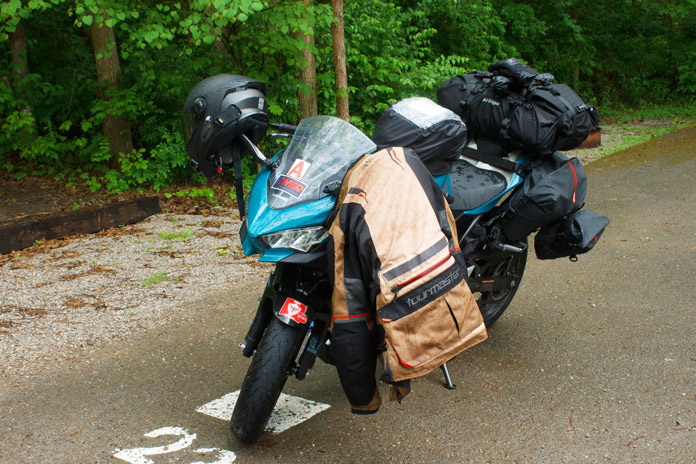
For motorcyclists, those worries don’t come up as often – motorcycle riding tends to require (and breed) a sense of fearlessness and confidence in and of itself. What I hear from fellow motorcyclists is that their equipment holds them back from touring or moto camping. In other words, because they don’t have the “right” bike!
Unlike their adventure brethren with high-towering suspensions and readily available luggage racks or touring motorcycles with plenty of space and smooth highway capability, sportbikes and other types of motorcycles are unfit for motorcycle travel – or so it may seem.
As someone who got her touring start on a Kawasaki Ninja 400, I can attest that it is not only possible to travel longer distances on a small-displacement sportbike but even enjoyable. The biggest issue is luggage space, and there are solutions.
Why Is Space an Issue?
Sportbikes are inherently shorter and squatter than adventure bikes, dual-sports, or enduros, with a shorter wheelbase and lower center of gravity. This means less physical space for luggage to sit. Add to that the lack of stock panniers, saddlebags, or even luggage racks – not to mention luggage manufacturers’ propensity to leave sportbikes off the list of aftermarket racks – and you’re left scratching your head as to where to put your gear.
The solution is twofold. Find the best luggage you can attach to your bike with ingenuity, while making your gear as small as possible.
Best Luggage Possible
For my first motorcycle tour, I stayed at a friend’s house near the Great Smoky Mountains in Tennessee. I had equal parts enthusiasm and cluelessness, but I knew I needed a way to transport my belongings.
After asking around, I found a friend willing to loan me their 30L Kriega Drypack. My husband had a 10L of the same brand, and I was able to easily attach the larger pack to the included straps under my seat and the smaller one to the other pack.
See all of Rider‘s luggage reviews here.
I learned my first motorcycle packing lesson that trip – it’s always harder to repack on the way home, especially if you bought a few too many souvenirs. On that Tennessee trip, my bags were bursting at the seams to begin with, so I don’t know what I was thinking when I purchased additional items. I ended up asking my friend to mail those items to my house!
Having loved my experience with my friend’s Kriega, I purchased two of my own Drypacks – a 40L and a 30L. I stacked them up the same way I had the 30L and 10L but not with the same result. My center of gravity was off, and the ride, especially at low speeds, was uncomfortable.
This high center of gravity was alleviated with the addition of some Sedici universal saddlebags. My first attempt at using them was less than ideal, as they sagged and touched my Ninja 400’s exhaust, burning a hole and melting my toiletries. Some adjustments helped stop the sagging, and they tended to be easier to ride with than the leaning tower of Kriega I had before.
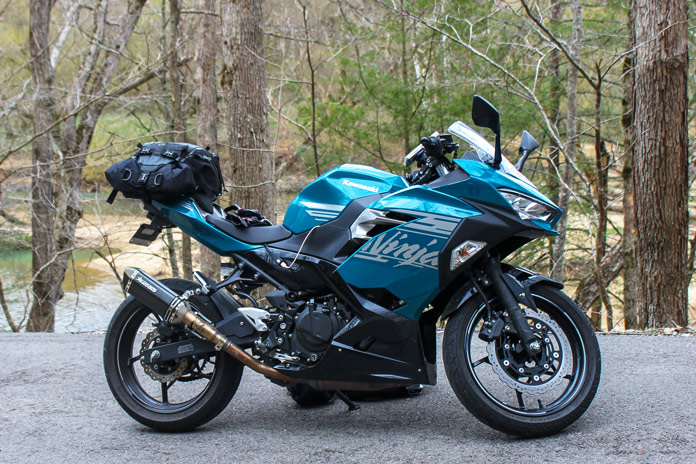
Smallest Gear Possible
If you think you’re going to fit a full kit of car camping gear on your motorcycle, you might be disappointed with the result. It’s important to purchase gear fit for the occasion. Unfortunately, there aren’t as many motorcycle-specific camping gear options for sale, especially in brick-and-mortar shops. What to do?
Luckily for us, a different group of adventurers also require packing compactly – backpackers. Given that their body is the vehicle for their kit, backpackers have an eye for getting the lightest, smallest, most packable gear possible. What fits on a person’s back may very well fit on your motorcycle just as well. Shop at outdoor and camping stores like REI and Sportsman’s Warehouse for backpacking essentials.
Saving space wherever possible is the name of the game, which is made easier with the ability to compress. Clothing or other soft items can be shrunk down to a fraction of their size using packing cubes. These zippered contraptions allow you to squeeze out all the air, saving you precious space. Compression sacks are another useful tool for squishy items like sleeping bags.
Some riders use cargo nets to secure their gear, but I won’t use one again. On my first moto camping trip, I used a cargo net to hold my sleeping bag (compressed in a stuff sack) onto one of my Kriega Drypacks. On the curvy backroads in Kentucky, it shifted back and forth with every turn.
A fellow motorcyclist whom I met on the road suggested Rok Straps, and I had ordered four on my phone before our conversation ended. These ingenious straps, which combine a wide bungee strap with a non-stretchable adjustable nylon strap with a quick-release buckle and webbed loops on each end, allow you to tie anything down securely. They can be used to tighten down soft luggage or to secure items to racks or pillion seats. I rarely ride without them, even when I’m not on a trip. You never know when you might need to buy something that doesn’t fit in your tank bag.
Related: Precious Cargo: The Art of Carrying Stuff on a Motorcycle
Touring or moto camping can be an exciting and even life-changing experience, regardless of what type of motorcycle you own. No one should let the myth that only certain types of motorcycles are capable of touring stop them from experiencing the thrill of a moto trip. I’m the case in point that it’s possible.

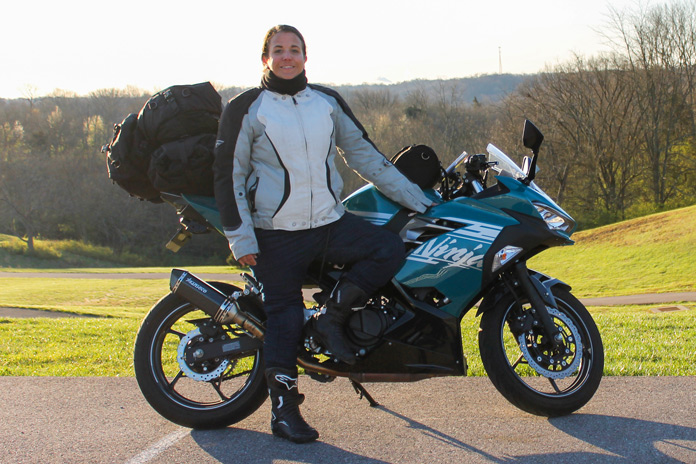
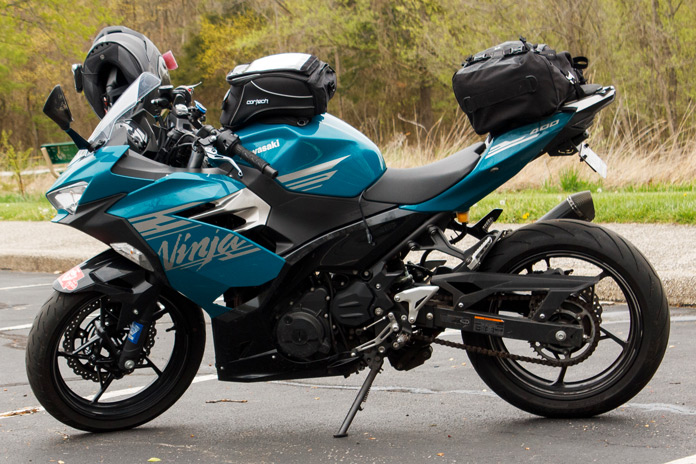
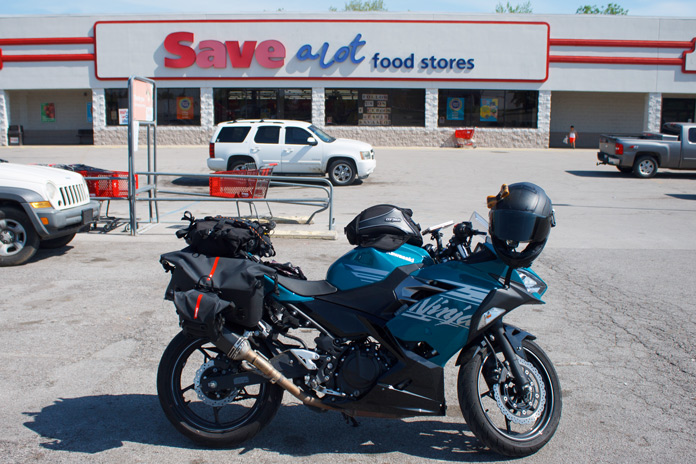
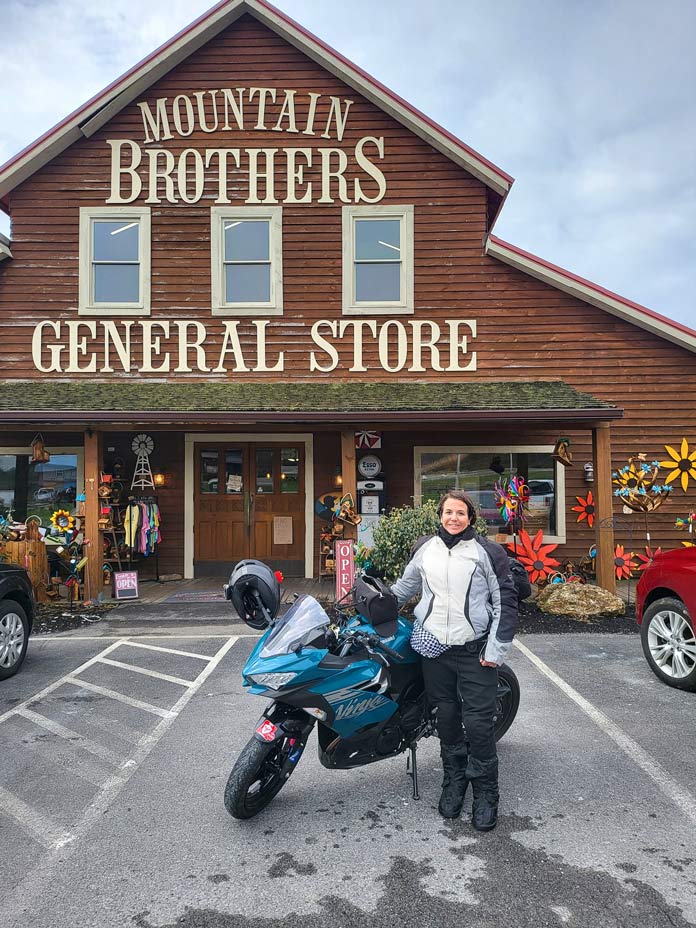
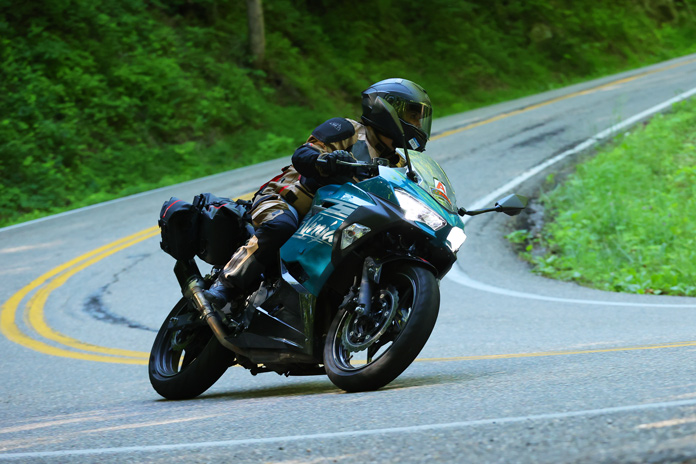
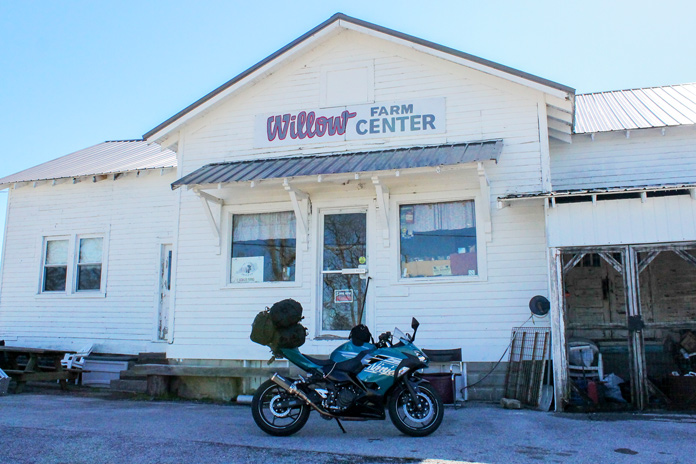
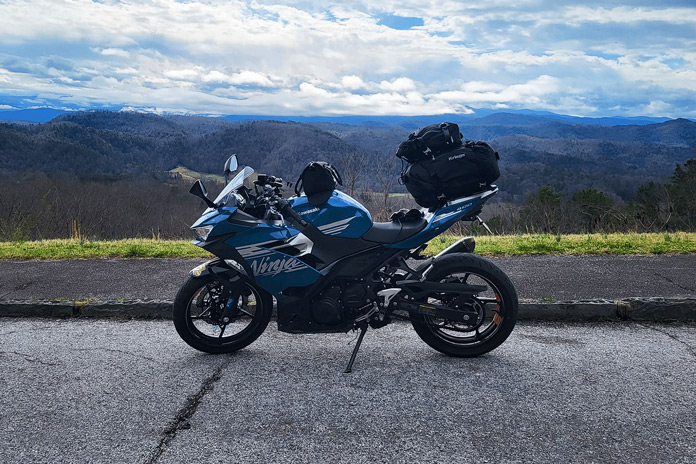
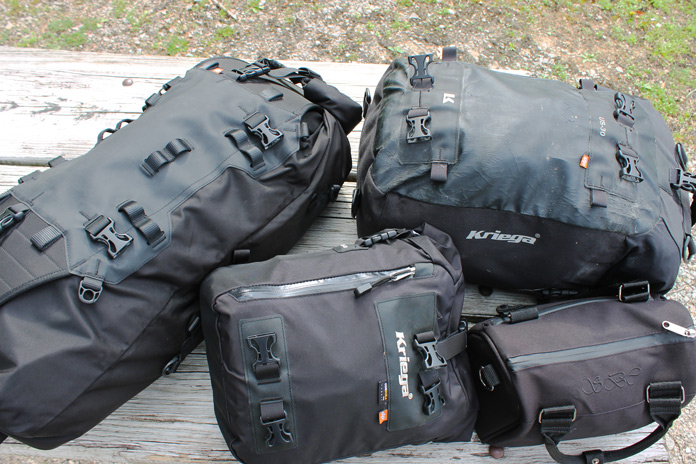
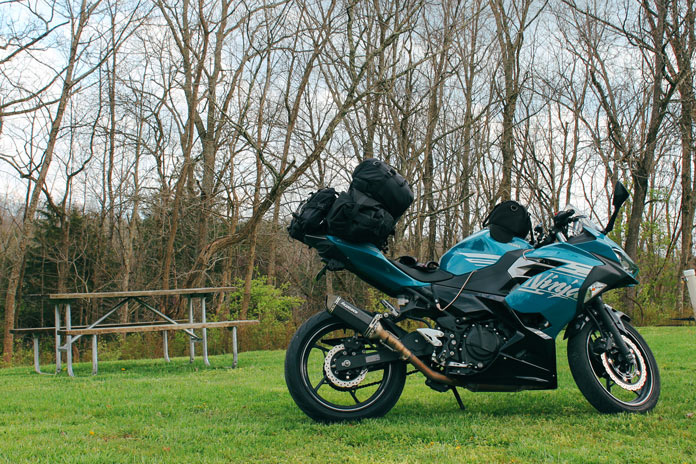
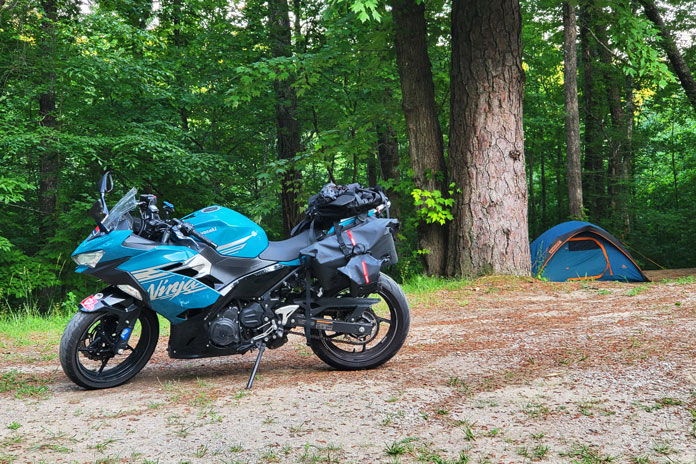
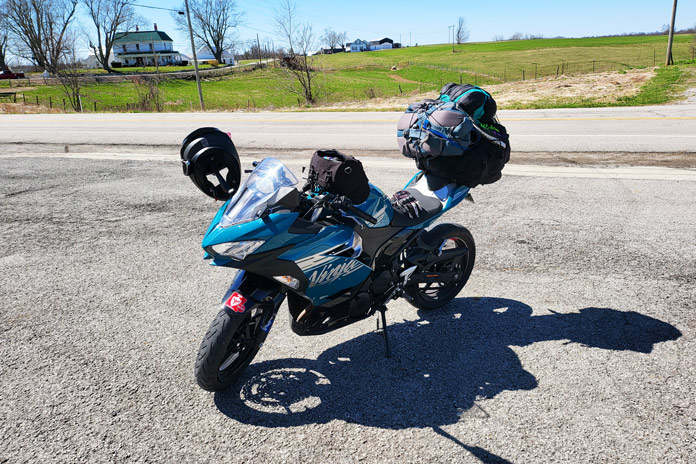
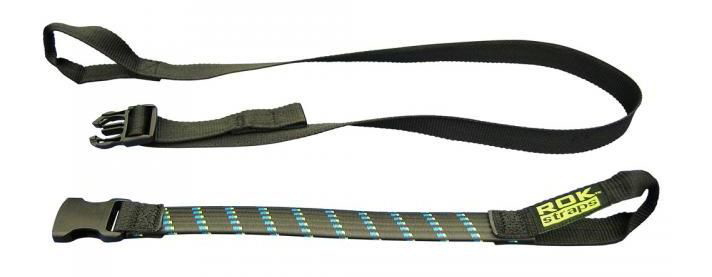





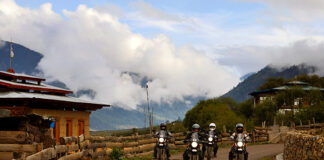

Good informative article. I couldn’t agree more. I toured before there was such a thing as an adv bike even if I do have one now
Thank you! ADV bikes do make for great trips, but a sportbike will do the trick, too! 🙂
I need to go touring
You should! It’s a ton of fun and you learn a lot about yourself.
TeapotOne. Around the world on a GSX-R1000.
I tour on a 2019 Triumph Speed Triple RS, covering up to 600 miles in a day.
Check out my instagram: 2_wheels_and_open_roads
To see how I kitted out my bike.
600 miles in a day is quite a haul. Good for you. Have to cover that ground when trying to go further away!
Couldn’t agree more with all you’ve said. I go motocamping on my S1000RR and I love it. I use SW Motech saddlebags and their dry bags as well and I don’t lack any conveniences. I have a cooking kit, chair, tarp and even a sink. Backpacking gear is the ideal model to follow. On a bike space is at a premium but weight is not so you don’t have to spend extra money for lightweight gear. Spend money on a good sleeping pad and bag. A good nights rest is a must when you’re riding every day. Thanks for the article. There aren’t many sport bike tourers out there.
Thank you! I agree with backpacking gear – it’s a lifesaver! Allows me to squeeze so much more stuff in there than if I tried to use regular camping equipment.
I have only ever had a sport bike. I cannot begin to tell you some of the stuff I have put on mine. I have taken many long trips on my Busa. The fun with a bike is you take all the important stuff in the backpack and leave the rest.
Yes! It’s very freeing to bring the bare minimum and leave all the “baggage” at home. Thanks for your comment.
Motivational .love the little ninjas
Thank you! The 400 is certainly a great motorcycle. 🙂
Where there’s a will, there’s a way. Trial and error is effective if one pays attention. Loose straps kill. Use common sense. Here endeth the lesson. That’ll be $20,000.
Rock on! I went on a Babes Ride Out this past June on my Ninja 650. Wish I could post pics here, but I had Reax 40L drypack (that held my 2 person tent, folding campinq chair, tripod stool, camping air mattress, quilt, air compressor and some other misc items) and Kriega 20L drypack that held everything else. To make my pack extra secure, I layered each with cargo nets as I stacked, and then finished off with the rock straps. It was a great ride an an amazing weekend!
Great article. I did two cross-continent rides on my Kawasaki ZX-9R: One from San Francisco to NYC, then down the Blue Ridge Parkway / Tail of the Dragon and other motorbike-specific twisties, then home. The second big ride was San Francisco to Victoria, BC; take a right onto the Trans-Canada Highway, and ride all the way to St John’s , NFL. I also did a 10-day tour of the UK and the Isle of Man on a hired Kawasaki 636. Many, many great memories, but I still got a few comments, “you can’t do that on a sport bike!” Overall, about 350,000 miles under my belt over 37 years, all on sport bikes.
YES!!! It CAN be done!!!
I’ve toured on a 2017 NINJA 300 from the Missouri Ozarks to Tail of the Dragon. I had a set of Givi semi-soft sidebags (I believe were 18L expandable to 25L. You HAD to deploy the rain covers if there was any more than a sprinkle) and a V47 top case. Currently I have the same top case on a 2018 NINJA 650 along with a set of 32L hard side bags. While I’ll treasure the camping adventures of my pre-motorcycling younger days, my body now INSISTS on a bed and climate control so I can be at my best for the duration of a 3000-4000 mile trip.
Have done two trips from Florida to Big Bend National park in Texas and another to north rim of Grand Canyon in Arizona onn a 2012 Honda CBR250R with soft saddlbags, tank bag, small suitcase strapped to the seat. The trip for mainly for fuel economy of 93 to 100 mpg. No need for a heavy weight motorcycle to do a long trip.
Glad you survived COVID, wish you were still in print.
We’re still in print, never stopped. You can renew your subscription here:
https://simplecirc.com/subscribe/rider-magazine
Great attitudes expressed here proving that you can go anywhere you choose on the bike you’re now riding. If you can ride your bike for a day, you can tour. It’s just one day after another, pretty simple really.
Ride, Eat, Sleep, Repeat as the old mantra goes.
Carly, I to use a 400 ninja for my touring bike, I use the Tusk Highlander luggage, luggage rack (just to fasten the back straps of the Highlander) and a tank bag. keeps the weight lower and farther foward, 80 liters total if I want
Interesting coincidence, I also tour on a Ninja 400 with Kriega luggage. May I suggest that an automatic chain oiler helps reduce maintenance while on the go.